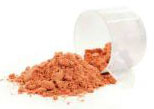Whey protein helps to lose weight by keeping you full, increasing metabolism and muscle mass.
With all the different diets and weight loss supplements out there claiming their way is the “magic bullet,” someone could really get lost; not to mention malnourished, fatigued, sore, sleepless, and partially INSANE! There is a product, however, that as long as you aren’t slurping it down and forgetting that it’s a substitute and not an addition, will help you with your weight loss goals.
Ladies and gentlemen, introducing Whey Protein.
Whey is derived from milk and is made up of protein, minerals, small amounts of fat, and lactose. When it comes to protein, whey is the “top dog.” Whey is the highest quality of protein and contains the highest level of Branch Chained Amino Acids. The absorption efficiency of a protein, by the body, is measured by Biological Value. The higher the number, the more efficient it is. The standard is set by egg protein, with a score of 100. Whey protein’s Biological Value can be as high as 170! Talk about an efficient protein!
There are three major forms of whey protein:
- Concentrate – Have the highest amount of fat and carbohydrates, making it the least desirable form for weight loss.
- Isolate – are processed to remove the lactose, carbohydrates, and fat.
- Hydrolysate – In addition to the benefits of Isolates, hydrolysate are predigested and partially hydrolyzed, allowing it to be metabolized easier.
Whey protein helps with weight loss in many ways.
- Protein creates feelings of “fullness,” which may help reduce calorie consumption.
- Diets containing high amounts of protein, increase insulin sensitivity. Increased insulin sensitivity improves blood sugar levels and reduces stored fat.
- Drinking a whey protein shake before and after exercise helps build lean body mass due to the rapidly delivered Amino Acids. An increase of lean body mass requires more calories to maintain, which will lead to fat loss.
- Raises serotonin levels. Low levels of serotonin are related to poor appetite control.
- Increases metabolism by binding with minerals, lipids, and other fat-soluble vitamins.
- Reduces oxidative damage to cells.
Now you know what whey is and how it can help support your weight loss goals. The next steps are a guideline to incorporate whey into your daily routine.
- Select a protein that you find tastes good. Chances are if you dislike the taste, it won’t become a part of your regular diet.
- Make sure you select an Isolate or Hydrolysate to avoid excess fat and carbohydrates.
- Exercise 3-5 times a week with at least 30 minutes of weight training to Increase your muscle mass. The increased muscle mass will help you burn more calories throughout the day.
- Consume a whey protein shake immediately after your workout to support muscle growth and recovery.
- Replace one of your daily meals with whey protein. This will help reduce your daily caloric intake and increase your daily protein intake.
So get off that diet that is restricting and depriving and start eating healthy. The true “magic bullet” for weight loss is: Give your body what it needs! Guess what, we all have different needs. Start with nutrient dense foods such as: fruits, vegetables, lean meats, and whole grains. Then, with your doctor’s supervision, add whey protein to support your weight loss goals.



Leave A Comment